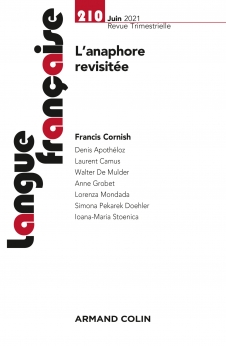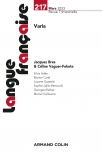
LANGUE FRANÇAISE Nº210 (2/2021)
Pour acheter ce numéro, contactez-nous
Recevez les numéros de l'année en cours et accédez à l'intégralité des articles en ligne.
L’objectif de cet article est d’étudier les différentes facettes du fonctionnement anaphorique des temps verbaux. L’auteur distingue trois processus anaphoriques : (i) par ancrage temporel, (ii) par repérage et (iii) par relais. Il analyse le fonctionnement de quelques temps verbaux relativement à ces trois processus. Il montre que le repérage anaphorique ne concerne que certains temps, c.-à-d. les temps composés ainsi que le conditionnel, tandis que l’ancrage temporel et le relais concernent tous les temps verbaux. Une attention particulière est accordée au plus-que-parfait dans les analepses, au conditionnel d’ultériorité ainsi qu’aux situations dans lesquelles un temps verbal proroge un contenu médiatif.
The aim of this article is to study the different aspects of the anaphoric functioning of tenses. The author distinguishes three anaphoric processes: via (i) temporal anchoring, (ii) localisation and (iii) relaying. He analyses the functioning of certain tenses in relation to the three processes, and shows that localisation concerns only certain of these, i.e. the compound tenses and the conditional, whereas temporal anchoring and relaying processes concern all tenses. Particular attention is paid to the pluperfect, especially in analepses, to the conditional of ulteriority, and situations in which a particular tense extends an evidential content.

